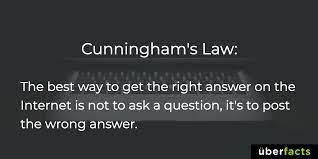Cunningham's Law
Curated from: linkedin.com
Ideas, facts & insights covering these topics:
9 ideas
·3.75K reads
17
3
Explore the World's Best Ideas
Join today and uncover 100+ curated journeys from 50+ topics. Unlock access to our mobile app with extensive features.
Concept's Statement.
Cunningham's Law states "The best way to get the right answer on the internet is not to ask a question; it's to post the wrong answer."
40
589 reads
Should you post incorrect statement?
Cunningham's Law highlights the participatory nature of online communities, where people are often eager to correct inaccuracies and share their knowledge.
By intentionally posting an incorrect statement, individuals can effectively engage others in a conversation and generate a more accurate and informative response.
This approach relies on the assumption that people are generally motivated to correct misinformation and showcase their expertise in a given subject.
30
421 reads
Rather give a wrong answer.
Even Sherlock Holmes in The Great Game says people do not like telling you things; they love to contradict you.
Therefore, if you want the right answer, do not ask a question rather give a wrong answer or ask a question in such a way that it already contains a wrong information.
30
414 reads
Socratic Irony.
Socratic irony is where you pretend to be ignorant of something so you can get greater clarity about it. In short, it’s a lot like Cunningham’s Law.
Ancient Greek philosopher, Socrates would sit on some public bench and talk to whoever happened to sit next to him. He’d often open his dialogues by presenting a false or deeply flawed argument and go from there. He would ironically agree with whatever his partner would say, but then raise a seemingly innocuous question to challenge that position.
source : Big Think.
33
390 reads
Two ways you can use Cunningham’s Law:
Cunningham’s Law is a curious psychological phenomenon, and it’s one that can be used to great advantage. From getting detailed responses out of experts on the internet to illuminating some unconscious desire, sometimes feigning idiocy has its perks.
Now, the two ways are :
- The Bad Option, &
- The Coin Toss.
source : Big Think.
31
390 reads
The Bad Option.
Have you ever been in a group where no one can decide what decision to make, and so you hover about in an awkward, polite limbo? “What restaurant shall we go to?” gets nothing. Instead try saying, “Let’s go to McDonald’s” and see how others object and go on to offer other ideas.
source : Big Think.
32
394 reads
The Coin Toss.
If you’re unsure about any life decision — like “Should I read this book or that book next?” or “Should I leave my job or not?” — do a coin toss. Heads you do X, tails you do Y. You are not actually going to live by the coin’s decision, but you need to make a note of your reaction to whatever outcome came of it. Were you upset at what it landed on? Are you secretly relieved? It’s a good way to elicit your true thoughts on a topic.
source : Big Think.
37
364 reads
Hope you start a Convo by Wrong Statement.
Link to Checkout BigThink Webpage.
Experiences after spending a week being wrong online.
Self-taught Developer Article on FreeCodeCamp.
For further information, I have listed these links I personally found them Intriguing. You can click and learn further about the effect.
You can have a wrong Convo with me @saoirseblr.
28
348 reads
IDEAS CURATED BY
CURATOR'S NOTE
Cunningham’s Law is a curious psychological phenomenon, and it’s one that can be used to great advantage.
“
Similar ideas
8 ideas
4 ideas
Other People’s Mistakes
collaborativefund.com
18 ideas
How People Think
collaborativefund.com
Read & Learn
20x Faster
without
deepstash
with
deepstash
with
deepstash
Personalized microlearning
—
100+ Learning Journeys
—
Access to 200,000+ ideas
—
Access to the mobile app
—
Unlimited idea saving
—
—
Unlimited history
—
—
Unlimited listening to ideas
—
—
Downloading & offline access
—
—
Supercharge your mind with one idea per day
Enter your email and spend 1 minute every day to learn something new.
I agree to receive email updates








